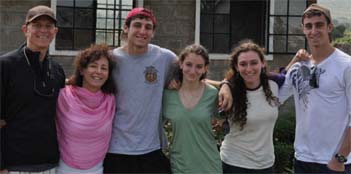Terry Axelrod on Lifelong Learning

From left to right: Terry Axelrod with his spouse Heather Shapiro and their children Daniel Axelrod (age 20), Charlotte Axelrod (age 15), Madlyn Axelrod (age 23) and Simon Axelrod (age 18) in Kenya,
early 2011, while they were involved in a school building programme with Free the Children.
Orthopaedic surgeon Terry Axelrod specializes in complex surgery of the
upper extremity at Sunnybrook Health Science Centre. When he was studying
hand and wrist surgery in Switzerland on a McLaughlin fellowship, his teachers
were among the originators of the AO Osteosynthesis System. They started
him on the path of continuing medical education.
The AO teaching program is an exceptionally well organized and well
regarded educational system that presents courses around the world. During his
fellowship, Terry worked with the AO trauma group in Berne. He got into continuing
education through teaching with the AO group faculty, including Jesse
Jupiter, Hill Hastings III and Ueli Buchler, all excellent surgeons and teachers.
|
The AO foundation runs training courses on methods of bone plating
and fracture treatment in many countries. AO regularly holds courses
worldwide for Orthopedic Surgeons and other health professionals. These
include hands-on experience in using the latest implants, as well as lectures
from expert surgeons and discussions. The foundation has a large
impact in the field of Maxillofacial surgery and many of the foundation
recommendations are used in that field.
(http://en.wikipedia.org/wiki/Arbeitsgemeinschaft _f%C3%BCr_Osteosynthesefragen)
|
When he returned to Toronto to join the faculty at
Sunnybrook Hospital, Marvin Tile and Joe Schatzker
were already participating in the AO programs. They were
very supportive of his developing this aspect of his career.
He now teaches fracture management all over the world
in courses in India, Europe and North America. "I enjoy
teaching practicing surgeons, because they have more life
experience and complex cases to discuss and analyze. My
wife, Heather Shapiro, who is a McMaster trained obstetrician
and gynaecologist, learned the importance of life
long learning at that institution. We need lifelong learning
and we need coaches. Though the AO courses are effective
in marketing, they are well - accredited and highly
regarded throughout the world. When I finished as Chief
of Orthopaedic Surgery at Sunnybrook, I migrated toward
teaching more continuing medical education courses and
in 2009 I accepted the position as Director of Continuing
Medical Education for our department. We all need
renewal and this is not limited to academic surgery - it’s a
challenge in all aspects of surgery."
|
"Our department is great at undergraduate and postgraduate
education. CME is less emphasized, but the
need for all surgeons to continue with life long learning
is the focus of my current activity (see also:
Gawande, A. Personal Best, The New Yorker, September
26, 2011 or go to: http://www.newyorker.com/ reporting/2011/10/03/111003fa_fact_gawande)
Hans Kreder and Terry are working on a Reduction of
Resource Program at Sunnybrook to allow surgeons to
continue to be active in the operating room, while making
opportunities for younger surgeons to enter practice.
Their draft proposal describes the impact of reducing
practice by 15% at age 66 and another 15% at age 67.
When 2 people do this, there is room for one new surgeon
in the division or department. The program phases out
operative surgical practice by age 70. There is a focus on
mentoring younger surgeons as the senior surgeons reduce
their resource utilization and operating room time.
"This is faculty development, not continuing medical
education in the usual sense. Working in the operating
room with patients is the most effective venue for teaching.
Workshops and skill labs are very good, but not as riveting
as working in the operating room on human patients. Industry has become the dominant educational force in the
post -training period. It is important for all of us to become
more involved in this important phase of surgical life.
"The post-grad office at 500 University Avenue has been
very effective in supporting post-grad courses under the
direction of Ivan Silver. Dimitri Anastakis has recently
assumed the responsibility as the new Vice-Dean of the
Medical School for Continuing Medical Education. This
should be a great boon to the Department’s development
in this area. Accreditation Coordinator Karma Fararh is a
dynamic staff member who facilitates all of these courses.
We need to encourage senior surgeons to participate in
mentoring, which is fun and stimulating. Peer mentoring
should also be encouraged - surgeons working together
to educate each other. We are also developing a longitudinal
fellowship of continuing education which will
allow an orthopeadic surgeon in practice elsewhere in
the province to come and work with a practitioner in our
department one half day every other week for six months
to become proficient in an area of specialized interest.
I would be grateful for other ideas from readers for
workshops that would be helpful for practicing surgeons.
These might address retirement, legal management,
and other issues that interest our readers."
M.M.
|